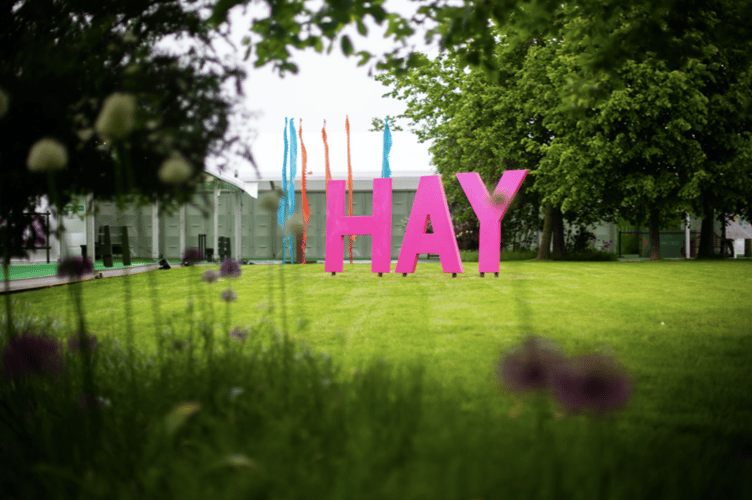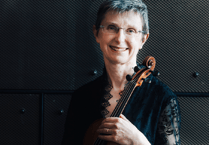When we think of witch hunts, we often think of Salem, Massachusetts, where mass hysteria spread. But throughout Early Modern Europe, over 50,000 people were killed for 'witchcraft'. In Wales, witch trials were few and far between. But today, we are seeing a different kind of fascination with witches. The rise of spirituality has incorporated witchcraft, and today we are seeing more people reclaim what it means to be a witch.
Anya Bergman, writer of The Witches of Vardø, is at the Hay Festival. She's arrived before her talk at 7 pm, where she is joined by Juno Dawson and Emilia Hart. All three women have written books that feed into what has been coined 'witcherature', or 'witchlit'. She started writing the book ten years ago, with it being published in January 2023.
"This is something we need to write about more," Anya says on the topic of why fiction about witches is seeing a surge. "These are stories that need to be reclaimed."
It's this reclamation of executed and trialled women that Anya wanted to tackle with this work. Every character except for Zare, a Sami boy character, is based on a real person. "Every single woman really existed. I felt a huge responsibility to honour their voices. It weighed on me heavily. 'Make sure you raise their voices with tenderness' became my motto. But also, in some way, the story gave them back some of the agency they may have lost."
The book is set in Norway. Anya has lived experience in Vardø, which helped her capture the vivid detail of the barren landscape. "I moved to Norway to write a book, but not this book. I was researching some things to do with that book when I came across the history of the witch trials in the far, far north of Norway. The tiny island of Vardø, far above the Arctic Circle. I was immediately interested and started delving into it. The original court records still exist. I started reading the original testimony of the women, and so immediately I was connecting to real women and their voices. That really sparked it. I was absolutely passionate about the fact I wanted to write this story."
In the wake of #MeToo, the need for strong feminist re-tellings has become ever the more important. Anya believes there is a 'contemporary relevance' to the work that is being published. "What I wanted to say in the book was about the women reclaiming not just the agency in terms of their voices, but also in their bodies. Sex came into the accusations and the way that the time period viewed women and their bodily functions, and sex, and it was all tied into the relationship with the Devil. You look at things like MeToo and you can see those parallels of patriarchal oppression and trauma for the women."

But there's also an element of fun for Anya, who has been drawn to witches since she can remember. The Witches of Vardø is more than just a re-telling. "I love history. I love Halloween. I love witches and fantasy." Anya says. She hopes that her book can shine a light on a period of history that often gets overlooked. "I also feel like we've forgotten about the real history, to the extent that it's not on the school curriculum."
She reminisces about a time she spoke to students, who hadn't heard of real-life witch trials. "We need to change the way we educate about the history of witch trials. It's a massive part of European history. It should be included in children's education. It was 300 years of persecution. Over 50,000 people were executed. Men as well, children too, but around 87% were women. One of the oldest prejudices of time is misogyny. There were many different reasons why there were witch hunts, but it was a factor."
Sat in the green room of the Hay Festival, Anya is excited to explore the town of books in the Powys countryside. "I'm really excited. I've always dreamed of going to Hay. My mum always used to talk about it, and she always wanted to go. I love Wales. One of my first trips was hiking around north Wales." She now lives in County Kerry and believes the Hay landscape is similar. "I'm looking forward to exploring it more, and it's a very special event."

Anya isn't stopping at Vardø. She already has a new book in the works. "The next novel I'm working on is called The Tarot Reader of Versailles. What I want to do in my books is go back into the past, and raise lost voices, but not just of Queens and notable women, but of poor women as well. Which is more challenging because they're not documented as much. It's based on a real woman."
Anya has experience with tarot, having once used the cards to read for people at markets. "I've always been into that side of things. I'm not a witch. I don't practice Wicca. I've always been interested in the spiritual side of my life. I've always worked with tarot. People's attitudes to tarot have really, really changed, using it as a tool for self-awareness. It's very important to me that the book is grounded in reality as well. That I don't lose the reader in esoteric meanderings."
It's this change of perception that has helped books on witches reach the masses. "Even though it tells the story of a very dark time, and there is tense material in there, my intention is to bring in magic realism to liberate the women from that trauma of patriarchal colonisation."




Comments
This article has no comments yet. Be the first to leave a comment.